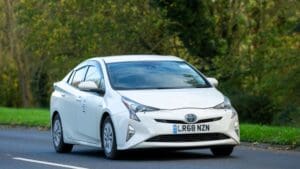
UK faces net zero crisis unless full hybrids are banned by 2030, warns motoring body
Britain must stick to its plan to stop selling new full hybrid cars without a plug from 2030 or risk a “catastrophic misstep” that undermines its net zero ambitions, the motoring group Electric Vehicles UK (EVUK) has warned.
The Department for Transport (DfT) will ban the sale of purely petrol and diesel cars from 1 January 2030, with a consultation under way to determine which types of hybrid vehicles could remain on sale until the end of 2034. Full hybrids, such as the Toyota Prius, recharge their batteries from an internal combustion engine and can drive only a few miles on electric power alone.
Dan Caesar, chief executive of EVUK, said that permitting full hybrids would be “a catastrophic misstep”, eroding public trust in the shift to electric vehicles. While he supports plug-in hybrids – which can drive greater distances in electric-only mode – remaining on sale until 2035, Caesar believes full hybrids cannot deliver genuine zero-emission motoring.
Dr Andy Palmer, former chief executive of Aston Martin and operating chief of Nissan, described full hybrids as preferable to mild hybrids but said they “belong to the late 1990s”.
Under the zero-emission vehicles (Zev) mandate introduced this year, carmakers must sell a set percentage of pure electric vehicles annually. The target rises from 22% in 2024 to 80% by 2030. Some industry players, including Vauxhall owner Stellantis, have warned of job losses if the timeline remains unchanged.
A DfT spokesperson said the government aims to work closely with industry to shape a smooth transition, adding that “drivers are already embracing electric vehicles faster than ever”.

